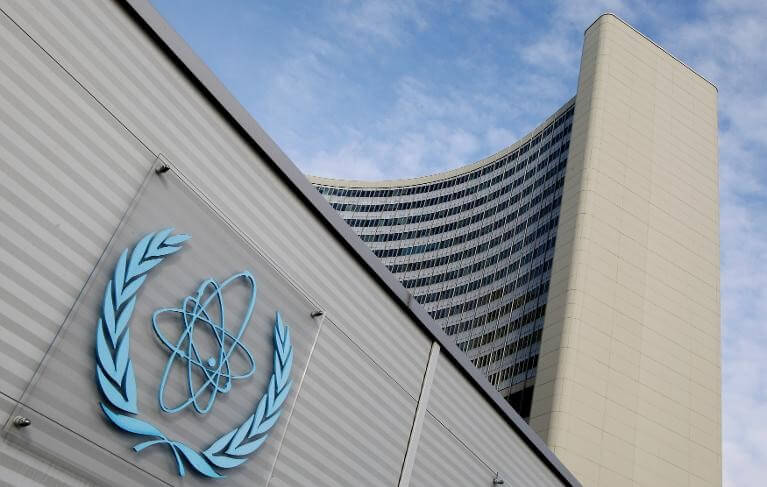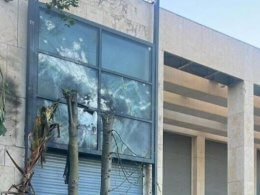With the United States and its European allies bent on reviving the 2015 Joint Comprehensive Plan of Action (JCPOA) with Tehran, many critics have pointed out the numerous ways the Iranian government has not been forthcoming on its nuclear production to the international community. Recently, International Atomic Energy Agency (IAEA) documents obtained by Tehran’s intelligence were sent to top officials while inspectors were launching an investigation into their suspected nuclear weapons program, according to a report by the Wall Street Journal Wednesday. For many, the latest reports on Iran’s use of secret U.N. records outlines the regime’s true intentions with its nuclear production, even as the U.S. and its European allies continue to negotiate with officials in Vienna.
In one of the handwritten notes attached to the documents, the chief of Iran’s nuclear production, Mohsen Fakhrizadeh tried to produce an explanation to the IAEA on why corporate-registration records had been changed for a civilian company called Kiumiya Maadan, that the regime claimed was working on an Iranian uranium mine. Iran's intelligence agency warned officials three days in advance to prepare for an IAEA inspection of a heavy-water production site near Arak, which is used as a coolant in reactors to produce plutonium for atomic weapons.
“The report confirms what most observers have suspected for some time: that Iran has lied and cheated on its nuclear program,” Jason Brodsky, policy director of United Against Nuclear Iran (UANI) said to The Foreign Desk.
“It is these deceptions, in part, that form the core of the distrust towards Tehran. Even though the story dates to two decades ago, it raises significant concerns over security at the IAEA, and Iranian intelligence capabilities in this regard,” Brodsky said.
“Vienna is known as a permissive environment for the Iranian intelligence services, and I think there needs to be a reckoning at the IAEA and in Austria over these troubling revelations. Iran needs to be more forthcoming about the ongoing activities.”
The acquisition of the documents and files from Israeli officials factored into the Trump administration’s approach towards Iran, withdrawing from the nuclear agreement in May of 2018 and enacting a crippling maximum pressure campaign against the mullahs in Tehran. While the Biden administration and officials have found the recent actions by Iran troubling, the administration is still bent on reviving the 2015 nuclear agreement to score a political victory. Countries like Israel and Saudi Arabia have called on the IAEA to increase and upgrade its monitoring procedures on Iran and demand more transparency and access to monitoring.
Ever since the Islamic Republic decided to engage in nuclear activities, regime officials ranging from presidents, supreme leaders, foreign ministers, and many others have argued that the weapons program is for civilian and not military use. Yet, even as officials continue to make this claim, the Islamic Republic has been producing numerous centrifuges and enriching uranium to levels needed for nuclear weaponry in underground military installations and even in Iranian universities. For years, the IAEA has been blocked from investigating such sites until the IAEA was allowed from 2003 to 2018 to inspect Iran’s nuclear facilities under strict conditions set out by the regime.
Not only have U.S. officials argued that Iran’s civilian-use explanation has proven weak, but Israel and Arab states close to Tehran have also stressed Iran’s true intentions to U.S. officials which have been mostly ignored by the Biden administration. The reports that Iran utilized confidential IAEA papers to cover up its nuclear activity only raises those concerns.
In a recent interview on Iranian media, a former member of Iran’s Parliament, Ali Motahari, stated that the regime always intended to build a nuclear bomb as a “means of intimidation,” contradicting the regime’s insistence that it never sought to build nuclear weapons. According to Middle East intelligence officials, Iran secured access to secret U.N. atomic agency reports two decades ago and circulated such documents among top level officials who created stories and falsified a record to conceal the suspected past work on nuclear weapons.
The internal documents from the IAEA reveal the tactics Tehran used with the international agency which has said that Iran has failed to answer key questions about its nuclear work for several years. Intelligence officials have further stated that the IAEA documents were circulated between 2004 and 2006 among senior Iranian military, government, and nuclear-program officials. Many former and current inspectors believe that Iran’s acquisition of sensitive IAEA documents represents a serious breach of IAEA internal security and that the regime could design answers that admit to what the IAEA already knows, giving away information that it will discover on its own.
In January 2018, Israeli intelligence seized thousands of IAEA records accessed by Iran, displaying the IAEA documents with commentary from Iranian officials. Israel has passed what it has obtained to the U.S. intelligence community, which concluded that Iran’s nuclear work had advanced further than what was previously understood.
Many analysts like Brodsky do not believe that the disclosures will “directly impact the nuclear negotiations themselves. However, they will serve to set the stage and shine a spotlight on Iran's continued stonewalling of the IAEA's safeguards inquiries. Given that the IAEA director-general has expressed frustration this week that the two parties are at a ‘very difficult juncture’ in the road map to which Tehran agreed some months ago to address these outstanding safeguards inquiries, this raises the prospect that a censure resolution will be pursued by the E3 and U.S. at the next IAEA Board of Governors meeting the week of June 6. It is long overdue for the U.S. and its allies to take that step because Tehran has only stalled while the diplomatic door has been wide open,” Brodsky said.










